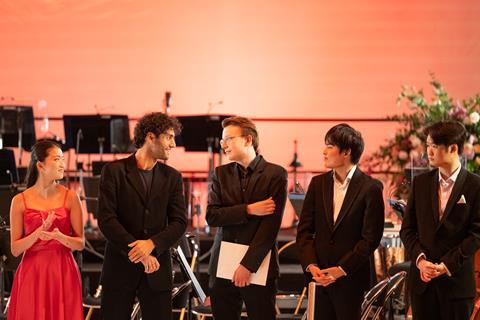Artist and writer Jonathon Brown attended the finals of the Long-Thibaud International Competition in Paris in November 2023 as a member of the press jury. He gives his impression of the five finalists’ varied and individual performances

Discover more Featured Stories like this in The Strad Playing Hub
No stranger to the noise of war, nor to controversy, the Long-Thibaud International Competition was inaugurated in occupied Paris in 1943 by pianist Marguerite Long and violinist Jacques Thibaud. It was reborn last year in its piano version, under the presidency of the tirelessly enthusiastic Gérard Bekerman, after the intrusions of both Covid and a heated episode that threatened to turn ugly, when the audience booed the jury’s choice of winners in the 2019 final.
This year it was the violinists’ turn (they alternate) and on Sunday 26 November, in a packed, old-fashioned modernistic concert hall – the Grand Amphithéâtre – in the University of Paris, five finalists offered their concertos to be judged. There were two Brahms, two Sibelius and a Tchaikovsky. The jury comprised Jean-Claude Casadesus (France), Jean-Jacques Kantorow (France), Sergey Khachatryan (Armenia), Boris Kuschnir (Austria), Marc Laforet (France), Silvia Marcovici (Romania), Sarah Nemtanu (France) and Akiko Suwanai (Japan). I attended as a member of the press jury – eight members of the press, allowed one vote each.
Bohdan Luts, an 18-year-old from Ukraine, took all the prizes – public, orchestra, press and jury – with an almost slickly controlled, even understated Sibelius. In other circumstances this whitewash might have been the spark of controversy, since the quality of his rivals was both high and quite evenly distributed. His Sibelius revealed a fine command of long line and pianissimo, but somehow the what’s-at-stake struggle underlying the sheen of the music was left not too ruffled.
On the other hand, playing last in the proceedings, an aptly all-but-crazed Sibelius, with the soloist seemingly aware of the piece’s frenzy out of which the pathos is hewn, won South Korean Dayoon You, aged 22, the second prize and closed the long afternoon on a frantic high.
Read: Violinist Bohdan Luts wins Long-Thibaud Competition
Read: Prizes awarded at the 2022 Carl Nielsen International Competition
Watch the finals of the Long-Thibaud International Competition 2023 here
Brahms took third and fourth place, so to speak, the jury preferring Japanese 18-year old Koshiro Takeuchi’s efficiently mastered presentation (he played the 1736 ‘Muntz’ Guarneri ’del Gesù’, on loan from the Nippon Foundation) to the 23-year-old Italian Francesco Sedona’s attentively poetic, at times almost improvisational vision. His slow movement was especially pastoral and affecting, a stroll or perhaps a seemingly unending trip on a gently Brahmsian ‘Bummelzug’ (slow train), with Sedona swaying, almost wandering on the stage, frequently facing the various instrumentalists in the orchestra with whom his solo needed to chime. Sedona and You were, most of all the contestants, players that achieved a distinction that I once heard musicologist Hans Keller make in a radio programme many years ago, and which has stayed with me ever since: of realising that the violin is also a fiddle.
Japan’s Miyu Kitsuwa took fifth place, the 23-year-old paying the price for an intensely personal, exploratory Tchaikovsky, both fascinated and fascinating, quiet and measured, as if whispering secrets in our ear. That is not how to win competitions (and she had to play first as well, always a slight curse) but her instinctive parlando and the expressive long line of the slow movement linger on. To my ears, she and You provided the most memorable and least predictable musicianship of the afternoon, with Sedona having perhaps the most idiomatic companionship with his chosen composer.
A word for the Republican Guard Orchestra conducted by François Boulanger: bravo. Six concertos (the winner repeats his as a gala finale) is a long haul, never mind only three different pieces. Inevitably the performances cannot have the detailed interactions that extended rehearsal could offer, but with Sedona and You especially engaged with them, the soloists were well supported.
Read: Grace, charm and effortless elegance: remembering violinist Jacques Thibaud
Read: Violist Tabea Zimmermann on the pressure of competitions
Read more Featured Stories like this in The Strad Playing Hub
The number one source for playing and teaching books, guides, CDs, calendars and back issues of the magazine.
In The Best of Technique you’ll discover the top playing tips of the world’s leading string players and teachers. It’s packed full of exercises for students, plus examples from the standard repertoire to show you how to integrate the technique into your playing.
The Strad’s Masterclass series brings together the finest string players with some of the greatest string works ever written. Always one of our most popular sections, Masterclass has been an invaluable aid to aspiring soloists, chamber musicians and string teachers since the 1990s.
American collector David L. Fulton amassed one of the 20th century’s finest collections of stringed instruments. This year’s calendar pays tribute to some of these priceless treasures, including Yehudi Menuhin’s celebrated ‘Lord Wilton’ Guarneri, the Carlo Bergonzi once played by Fritz Kreisler, and four instruments by Antonio Stradivari.






































No comments yet